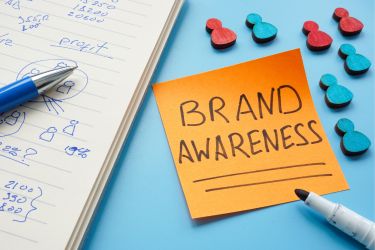
Brand awareness is crucial for new businesses and startups, but building brand awareness is an ongoing process that needs focus and attention from established companies as well. Getting your brand in front of your target audience makes a huge difference when it comes to implementing a growth strategy, but one of the most common roadblocks business owners face when building brand awareness is the cost involved in traditional advertising.
Although it’s true that there is usually an investment cost involved in any type of brand awareness campaign, this shouldn’t deter you from seeking new opportunities. There are several low-cost ways to build brand awareness that you can start using today, including:

If your brand isn’t using social media to build brand awareness, you’re missing out on one of the most powerful marketing tools available. Social media allows brands to get their products or services in front of huge audiences at no cost, and even paid social media advertising can cost less than traditional advertising methods.
The key to getting the most out of social media for building brand awareness is to understand that your brand must move beyond just marketing to friends and family. Instead, you want to look at social media as a tool that is used to form relationships. Anyone can put ads on social media platforms and hope for the best, but people see ads every single day. In fact, many just ignore them.
Instead, you want to focus on getting your social media ads and content in front of potential customers who are within your target audience. Most social media advertising platforms offer a way to target specific demographics, so rely on these tools to start building relationships with the right people.
You can also do research on your target audience through social media. Take a look at comments on your competitor’s social media posts to see what people have to say about their products and services. You can then use this to your advantage to position your brand as the better choice.
This research also provides key insights that can help you keep your finger on the pulse of the consumer. Look through local groups and special interest groups on social media to read conversations consumers have with one another about the industry your company serves. Look for opportunities within these conversations to get your brand found where consumers are focusing their attention.

Keep in mind, however, that brand awareness on social media doesn’t happen overnight. It can take time to extend your reach considering how vast some social media platforms are across the world.
Fortunately, when you use your brand’s social media pages to engage with users in your target market, you have the opportunity to get free advertising while building goodwill among potential buyers. This is really where the power of social media lies for building brand awareness – in creating connections with users who get sorted into leads and then converted into customers.
Social media marketing to build brand awareness should not use a scattershot approach. While it’s true that you want to get your brand in front of as many people as possible, you want to find potential customers, not just random individuals. There’s no use in building brand awareness if the people being made aware of your brand are never going to make a purchase.
If, for instance, you brand sells hair care products, you likely don’t want to focus your efforts on social media groups that cater to bald men. Likewise, if your company books travel accommodations and cruises, you don’t want to spend time building brand awareness in social media groups for agoraphobics. While it’s entirely possible that these people may tell others about your brand despite having no plans to make a purchase themselves, this is still not a good use of your time and marketing resources.
By finding social media groups and profiles whose interests match with the products and services your company provides, you have built-in leads ready to go. You still need to qualify these leads, and building brand awareness is just the first step in successfully marketing your brand and closing sales. Moving leads down your funnel is ultimately how your brand will make money, but building brand awareness on social media is a great starting point.

While logged into your business social media accounts, take time to offer insight to others. Make comments on others’ posts or engage with similar or complementary brands. Find pages that have a large number of followers and engage in discussions with users there through your brand social media accounts.
In doing this, you’re building brand awareness, but you’re also demonstrating topical authority. The goal here is to position your business to get followers who will then see your company’s social media updates each time you post content.

Blog posts are another low-cost way to raise brand awareness. Blog posts serve two vital purposes when it comes to your brand awareness strategy – they demonstrate topical authority about your products, services and industry, and they also get your brand in front of people searching for the products and services your company offers.
This latter part is accomplished through search engine optimization (SEO). In a nutshell, SEO is done in large part by including relevant keywords in your blog posts that people use to find brands like yours. This way, your posts and brand’s website get found when potential customers search for the products and services your business offers. Determining what keywords people use to search for your products and services is the vitally important here, and knowing how people search is another essential component.
Of course, there’s a lot more to SEO than just including some keywords in your blog posts. The type of content you publish, how it gets found by search engines and how often you publish content can all have an effect on whether your brand gets in front of the right potential customers. This is why it’s always a good idea to partner with a marketing agency that provides SEO when building a site that generates leads. Inbound links from high-authority sites are another important aspect of SEO, and your blog posts also need to align with your content marketing strategy.
Brand awareness campaigns don’t have to be all-digital either. Word of mouth marketing remains one of the most effective strategies you can use, and there are plenty of low- or no-cost word-of-mouth strategies your company can use to increase your brand awareness.
For example, consider creating a loyalty program that offers an incentive for people to spread the word about your brand. You could offer a discount on products or services if someone recommends your company to others. This encourages existing customers to tell friends and family about their experiences, and that raises brand awareness among people who are more likely to want your products and services.

You can also encourage customers to leave reviews on the web. This can be done through a hybrid approach where you solicit reviews online but also encourage them by including solicitations on collateral left with customers after service is completed or in printed material included with a product.
Online reviews help to build brand awareness because they are looked at as trustworthy. People believe the experiences of other people over the promises made by brands. People also look to online reviews and review sites to learn about new products and services. As a form of digital word-of-mouth marketing, reviews are invaluable to your brand awareness strategy.
No matter how you choose to implement a brand awareness strategy, you want to have ways to measure success. You can measure brand awareness using specialty tools, but each business is different. If you work with a digital marketing partner, they may have proprietary tools for measuring brand awareness success.

At a low level, you can measure brand awareness by looking at engagement touchpoints. For instance, make a note of your current sales and website visits before beginning a brand awareness campaign. Then, track how many people visit your website or make purchases over the course of a brand awareness campaign. Afterward, compare the numbers to see if you notice an upward trend.
This is a simple way to do things, but you can get as granular as you would like. Various data tools can provide more in-depth analysis if you want to really invest in measuring these things, but no matter how you choose to measure success, it’s important to have methods in place.
The ultimate goal here is to see what happens when you try various methods of building brand awareness. When you keep a record of activities and compare your actions against changes in engagement, you have a chance to see what has paid off and to what degree. If you make a change to your brand awareness strategy and notice a huge spike in engagement shortly thereafter, you can safely assume that this was a good change and should be replicated.
On the other hand, if you invest a lot of time into a specific strategy and see very little engagement following the implementation of this strategy, you may assume that the change was not as effective and you should move on to a different strategy. Once again, it all comes back to having methods in place to track changes and measure results.
If you’ve tried to increase brand awareness on your own and found that it’s tougher than you thought or you simply want insight from digital marketing experts, contact E-Marketing Associates. Right now, you can get our exclusive free business report that offers personalized insights about how your business stacks up against your competition. To learn more about how E-Marketing Associates can help build brand awareness for your business, call (626) 415-3388, or use our convenient contact form to schedule your no-obligation consultation.
Leverage social media engagement, publish SEO-friendly blog posts, encourage reviews, run a referral program, and join niche online communities. These tactics cost little yet steadily expose your brand to new audiences and build credibility.
Social platforms let you reach huge audiences for free. Post value-driven content, join relevant groups, converse in comments, and use paid targeting when budget allows. Building genuine relationships and answering questions positions your company as helpful, boosting awareness without expensive ads.
Targeting ensures your message reaches people who actually need your product. Instead of blasting everyone, focus on demographics, interests, and problems matching your offer. This saves money, increases engagement, and shortens the path from awareness to purchase.
Well-written blogs packed with relevant keywords answer questions buyers ask online. Search engines reward this with higher rankings, sending organic traffic to your site. Every optimized post acts like a silent salesperson introducing the brand continuously, yet costs only time and consistency.
Track website sessions, social follows, post engagement, referral code redemptions, and review counts before and after each campaign. Comparing these numbers over time reveals which low-cost tactics move the needle, letting you refine efforts and invest resources where they return the best results.